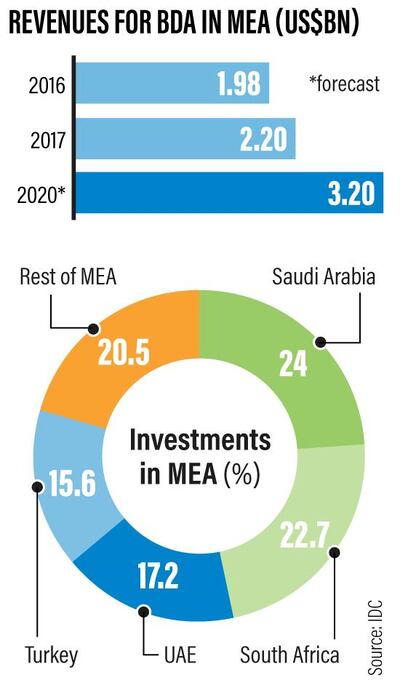Big Data and Analytics (BDA) industry, revenues from which are forecast to reach $3.2 billion (Dh11.75bn) in the Middle East and Africa region by 2020, is confronted with a major challenge - data backup, said experts.
Big data sets hold enormous amounts of information that are too intricate to understand using traditional data-processing applications. However backing this potential wealth of ever-increasing business intelligence is a major problem for the industry and not every vendor involved is capable of doing so.
"You need to backup the big data platform as well as archives of ageing data. This is still a new concept and not very evolved in the [MEA] region," said Santhosh Rao, research director at Gartner, a global research and advisory company.
“There are certain vendors who are sending their data to Amazon or other public clouds and have disaster recovery of big data in the cloud itself. But not many customers here have adopted those tactics.”
BDA studies large volumes of data to discover unseen links, configurations and correlations, deploying complex analytics tools to draw business intelligence. Companies are increasingly adopting BDA applications in order to understand consumer behaviour and preferences to take strategic business decisions and offer customised services.

BDA revenues are predicted to surge at a compound annual growth rate of 10 per cent over the 2016-20 period in MEA, according to the International Data Corporation, a market intelligence and advisory services provider in Massachusetts.
When it comes to technologies used in BDA implementation, a large portion of investment, close to 50 per cent, is focused on IT and business services, followed by software, according to an IDC study.
“Markets like the US, or may be a few instances in the UK and Singapore, do have big data backup plans that are well thought-of and part of their architecture,” Mr Rao said. “But in the Middle East, there have not been many deployments for big data backup yet. They [companies] are still in the first phase of setting up of big data itself [getting all the data on the platform]. Big data [usage] is very low, less than 10 per cent of enterprises are doing it, forget about backup.”
_____________
Read more:
[ Apple acquires maker of lenses for AR glasses ]
A look into the state of bendable phone technology
_____________
However, big data may get a stronger push in the region as funding allocation to IT in the region increases. Gartner, forecasts spending on IT in the broader Middle East and North Africa region could reach $155bn in 2018, a 3.4 per cent year-on-year increase.
"There is a lot of scope if there is a proper backup as it [big data] is still not fully utilised in the region. It can turn around business fortunes, especially in the industries like aviation and banking that hold huge data related to their consumers," said Vinod Vasudevan, the chief executive of automation specialist Flytxt, a customer data analytics software company.
In July, Flytxt launched Robo-X software, which evaluates big data for marketing professionals in the region.
However, with everything stored in the digital and cyber spheres, there are some security concerns surrounding the big data industry.
“Big data brings a new breed of security concerns. It’s precisely the unstructured nature of big data that makes it more vulnerable to security breaches than the corporate information generated by your usual applications,” said Paul Potgieter, managing director UAE at Dimension Data, an IT specialist in Johannesburg.
Capturing and effectively using data from countless sources, in different formats, and in real time (volume, velocity, variety), touches almost every aspect of the IT ecosystem, ranging from storage to security, he said.
From a geographical investment perspective, more than 24 per cent of the MEA’s BDA spending in 2016 was recorded in Saudi Arabia, the biggest Arab economy. South Africa and the UAE, accounted for 22.7 and 17.2 per cent respectively, according to the IDC survey.
“The explosion of data and the need to protect it, combined with new technologies, web-based workloads and mobile applications are reshaping customer expectations and fostering a new demand for consistent, yet personalized experiences,” said Jane Zhu, senior vice president of data protection and governance engineering at Veritas, an American international data management firm.
Veritas has recently launched Veritas NetBackup 8.1.2 in the UAE to help organisations protect data, helping authorised users, including backup administrators, to securely access and manage the backup and recovery of company data using their mobile devices.







